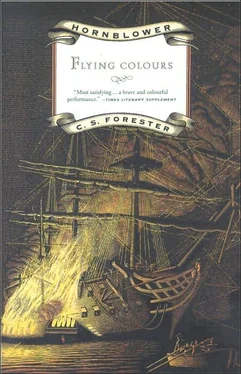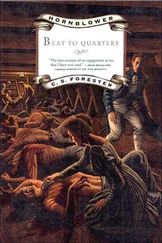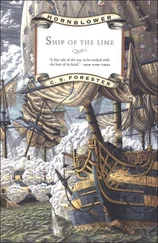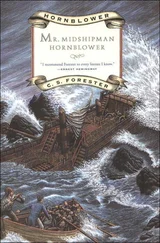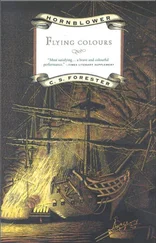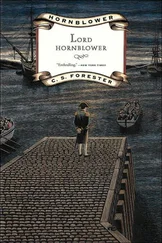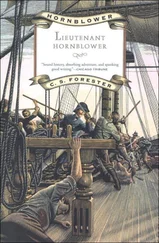Cecil Forester - Flying Colours
Здесь есть возможность читать онлайн «Cecil Forester - Flying Colours» весь текст электронной книги совершенно бесплатно (целиком полную версию без сокращений). В некоторых случаях можно слушать аудио, скачать через торрент в формате fb2 и присутствует краткое содержание. Год выпуска: 1989, ISBN: 1989, Издательство: Back Bay Books, Жанр: Исторические приключения, Путешествия и география, Морские приключения, на английском языке. Описание произведения, (предисловие) а так же отзывы посетителей доступны на портале библиотеки ЛибКат.
- Название:Flying Colours
- Автор:
- Издательство:Back Bay Books
- Жанр:
- Год:1989
- ISBN:0316289396
- Рейтинг книги:5 / 5. Голосов: 1
-
Избранное:Добавить в избранное
- Отзывы:
-
Ваша оценка:
- 100
- 1
- 2
- 3
- 4
- 5
Flying Colours: краткое содержание, описание и аннотация
Предлагаем к чтению аннотацию, описание, краткое содержание или предисловие (зависит от того, что написал сам автор книги «Flying Colours»). Если вы не нашли необходимую информацию о книге — напишите в комментариях, мы постараемся отыскать её.
Flying Colours — читать онлайн бесплатно полную книгу (весь текст) целиком
Ниже представлен текст книги, разбитый по страницам. Система сохранения места последней прочитанной страницы, позволяет с удобством читать онлайн бесплатно книгу «Flying Colours», без необходимости каждый раз заново искать на чём Вы остановились. Поставьте закладку, и сможете в любой момент перейти на страницу, на которой закончили чтение.
Интервал:
Закладка:
“I know,” said Bush. “I know what he’s going to do—sir.”
Only as an afterthought did he say that ‘sir’; which was the clearest proof of his mental preoccupation. He grasped the bedclothes in his two fists, his jaw set and his eyes shut.
“I’m ready,” he said through his clenched teeth.
The surgeon drew firmly on one of the threads and Bush writhed a little. He drew on the other.
“A-ah,” gasped Bush, with sweat on his face.
“Nearly free,” commented the surgeon. “I could tell by the feeling of the threads. Your friend will soon be well. Now let us replace the dressings. So. And so.” His dexterous plump fingers rebandaged the stump, replaced the wicker basket, and drew down the bed coverings.
“Thank you, gentlemen,” said the surgeon, rising to his feet and brushing his hands one against the other. “I will return in the morning.”
“Hadn’t you better sit down, sir,” came Brown’s voice to Hornblower’s ears as though from a million miles away, after the surgeon had withdrawn. The room was veiled in grey mist which gradually cleared away as he sat, to reveal Bush lying back on his pillow and trying to smile, and Brown’s homely honest face wearing an expression of acute concern.
“Rare bad you looked for a minute, sir. You must be hungry, I expect, sir, not having eaten nothing since breakfast, like.”
It was tactful of Brown to attribute this faintness to hunger, to which all flesh might be subject without shame, and not merely to weakness in face of wounds and suffering.
“That sounds like supper coming now,” croaked Bush from the stretcher, as though one of a conspiracy to ignore their captain’s feebleness.
The sergeant of gendarmerie came clanking in, two women behind him bearing trays. The women set the table deftly and quickly, their eyes downcast, and withdrew without looking up, although one of them smiled at the corner of her mouth in response to a meaning cough from Brown which drew a gesture of irritation from the sergeant. The latter cast one searching glance round the room before shutting and locking the door with a clashing of keys.
“Soup,” said Hornblower, peering into the tureen which steamed deliciously. “And I fancy this is stewed veal.”
The discovery confirmed him in his notion that Frenchmen lived exclusively on soup and stewed veal—he put no faith in the more vulgar notions regarding frogs and snails.
“You will have some of this broth, I suppose, Bush?” he continued. He was talking desperately hard now to conceal the feeling of depression and unhappiness which was overwhelming him. “And a glass of this wine? It has no label—let’s hope for the best.”
“Some of their rotgut claret, I suppose,” grunted Bush. Eighteen years of war with France had given most Englishmen the notion that the only wines fit for men to drink were port and sherry and Madeira, and that Frenchmen only drank thin claret which gave the unaccustomed drinker the bellyache.
“We’ll see,” said Hornblower as cheerfully as he could. “Let’s get you propped up first.”
With his hand behind Bush’s shoulders he heaved him up a little; as he looked round helplessly, Brown came to his rescue with pillows taken from the bed, and between them they settled Bush with his head raised and his arms free and a napkin under his chin. Hornblower brought him a plate of soup and a piece of bread.
“M’m,” said Bush, tasting. “Might be worse. Please, sir, don’t let yours get cold.”
Brown brought a chair for his captain to sit at the table, and stood in an attitude of attention beside it; there was another place laid, but his action proclaimed as loudly as words how far it was from his mind to sit with his captain. Hornblower ate, at first with a distaste and then with increasing appetite.
“Some more of that soup, Brown,” said Bush. “And my glass of wine, if you please.”
The stewed veal was extraordinarily good, even to a man who was accustomed to meat he could set his teeth in.
“Dash my wig,” said Bush from the bed. “Do you think I could have some of that stewed veal, sir? This travelling has given me an appetite.”
Hornblower had to think about that. A man in a fever should be kept on a low diet, but Bush could not be said to be in a fever now, and he had lost a great deal of blood which he had to make up. The yearning look on Bush’s face decided him.
“A little will do you no harm,” he said. “Take this plate to Mr. Bush, Brown.”
Good food and good wine—the fare in the Sutherland had been repulsive, and at Rosas scanty—tended to loosen their tongues and make them more cheerful. Yet it was hard to unbend beyond a certain unstated limit. The awful majesty surrounding a captain of a ship of the line lingered even after the ship had been destroyed; more than that, the memory of the very strict reserve which Hornblower had maintained during his command acted as a constraint. And to Brown a first lieutenant was in a position nearly as astronomically lofty as a captain; it was awesome to be in the same room as the two of them, even with the help of making-believe to be their old servant. Hornblower had finished his cheese by now, and the moment which Brown had been dreading had arrived.
“Here, Brown,” he said rising, “sit down and eat your supper while it’s still hot.”
Brown now at the age of twenty-eight, had served His Majesty in His Majesty’s ships from the age of eleven, and during that time he had never made use at table of other instruments than his sheath knife and his fingers; he had never eaten off china, nor had he drunk from a wineglass. He experienced a nightmare sensation as if his officers were watching him with four eyes as large as footballs the while he nervously picked up a spoon and addressed himself to this unaccustomed task. Hornblower realized his embarrassment in a clairvoyant flash. Brown had thews and sinews which Hornblower had often envied; he had a stolid courage in action which Hornblower could never hope to rival. He could knot and splice, hand, reef, and steer, cast the lead or pull an oar, all of them far better than his captain. He could go aloft on a black night in a howling storm without thinking twice about it, but the sight of a knife and fork made his hands tremble. Hornblower thought about how Gibbon would have pointed the moral epigrammatically in two vivid antithetical sentences.
Humiliation and nervousness never did any good to a man—Hornblower knew that if anyone ever did. He took a chair unobtrusively over beside Bush’s stretcher and sat down with his back almost turned to the table, and plunged desperately into conversation with his first lieutenant while the crockery clattered behind him.
“Would you like to be moved into the bed?” he asked, saying the first thing which came into his head.
“No thank you, sir,” said Bush. “Two weeks now I’ve slept in the stretcher. I’m comfortable enough, sir, and it’d be painful to move me, even if—if—”
Words failed Bush to describe his utter determination not to sleep in the only bed and leave his captain without one.
“What are we going to Paris for, sir?” asked Bush.
“God knows,” said Hornblower. “But I have a notion that Boney himself wants to ask us questions.”
That was the answer he had decided upon hours before in readiness for this inevitable question; it would not help Bush’s convalescence to know the fate awaiting him.
“Much good will our answers do him,” said Bush, grimly. “Perhaps we’ll drink a dish of tea in the Tuileries with Maria Louisa.”
“Maybe,” answered Hornblower. “And maybe he wants lessons in navigation from you. I’ve heard he’s weak at mathematics.”
That brought a smile. Bush notoriously was no good with figures and suffered agonies when confronted with a simple problem in spherical trigonometry. Hornblower’s acute ears heard Brown’s chair scrape a little; presumably his meal had progressed satisfactorily.
Читать дальшеИнтервал:
Закладка:
Похожие книги на «Flying Colours»
Представляем Вашему вниманию похожие книги на «Flying Colours» списком для выбора. Мы отобрали схожую по названию и смыслу литературу в надежде предоставить читателям больше вариантов отыскать новые, интересные, ещё непрочитанные произведения.
Обсуждение, отзывы о книге «Flying Colours» и просто собственные мнения читателей. Оставьте ваши комментарии, напишите, что Вы думаете о произведении, его смысле или главных героях. Укажите что конкретно понравилось, а что нет, и почему Вы так считаете.
